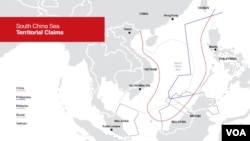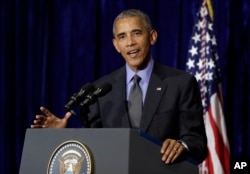President Barack Obama said Thursday he made it clear to Southeast Asian leaders gathered in Laos that the United States will continue to stand with the people of the region.
He has made re-balancing U.S. policy with a focus toward Southeast Asia a priority during his presidency, which ends in January. Obama said his hope and expectation is that his successor continues that effort.
"This is where the action's going to be when it comes to commerce and trade, and ultimately creating U.S. jobs by being able to sell to this market," Obama told reporters after a meeting of leaders from the Association of Southeast Asian Nations.
He said the group recognized the importance of a July international arbitration ruling dismissing China's territorial claims in the South China Sea, and the importance for those claiming parts of the disputed region to not militarize those areas or occupy uninhabited islands.
"I reiterated that the United States will stand with allies and partners in upholding fundamental interests, among them the freedom of navigation and overflight, lawful commerce that is not impeded, and peaceful resolution of disputes," Obama said.
North Korea
Regarding North Korea's nuclear weapons program, the U.S. president said his policy has been not to reward bad behavior.
"It's not as if we are looking for a problem or avoiding a willingness to engage diplomatically, but diplomacy requires that Pyongyang meet its international obligations."
He pledged to continue pressuring the North Korean government while also putting in place defensive measures to ensure the U.S. and its allies are protected.
Another of his administration's goals was to close the U.S. detention center in Guantanamo Bay, Cuba. Nearly 800 people have been held there since 2002, but about 60 detainees remain. Obama said he is not ready to concede that some will still be there when he leaves office.
"I continue to believe that Guantanamo is a recruitment tool for terrorist organizations, that it clouds and sours some of the counterterrorism cooperation that we need to engage in, and it's not necessary and it's hugely expensive for U.S. taxpayers."
Deeper US cooperation
Obama's meeting with ASEAN leaders was the eighth of his presidency. He has visited the region more than any of his predecessors. He said earlier Thursday his repeat visits reflect Asia's growing importance.
Obama said the U.S. will deepen economic cooperation with nations in Asia, including promoting innovation and entrepreneurship. And he reiterated, as he has multiple times during his visit this week, that he will push for Congress to pass the Trans-Pacific Partnership trade deal.
A White House statement on U.S.-ASEAN initiatives highlighted initiatives to promote low-carbon growth, support sustainable fisheries, increase the supply of renewable energy, and promote opportunities for women including protecting rights, holding seminars for young leaders and awarding a prize for women in science.
"We'll continue to partner to strengthen global health security and fight epidemics," Obama said. "We will continue to make progress on people-to-people ties, scientific exchanges and making sure that we are are increasing continually the opportunities for our businesses, our students, our scientists, our people to work together."









